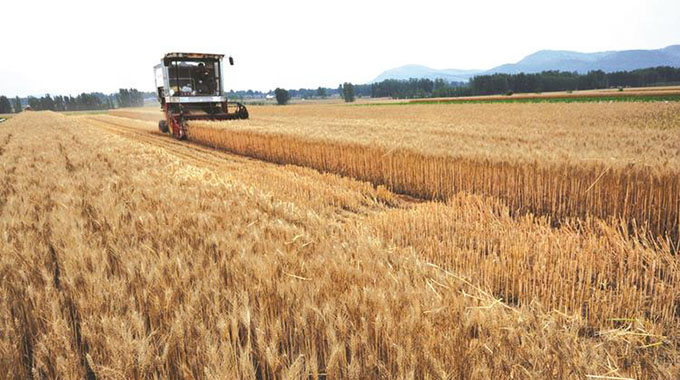
Political Editor
The Global Compensation Deed agreement between the Government and white former farmers whose land was expropriated under land reform makes it clear that there will be no compensation for the land itself, but, as laid down in the Zimbabwean Constitution and law, there will be compensation for improvements, biological assets and land clearing costs.
The main sticking point in the negotiations that led to the agreement was not the land compensation issue, the farmers having accepted that this was not on the table, but the actual value of the improvements, with the Government looking initially at a figure of US$1,2 billion and the farmers at US$5,4 billion.
Rather than argue indefinitely, regional independent assessors were brought in to review the valuation.
That in turn led to a Government offer of US$3,5 billion after further talks, which the farmers, after a referendum, accepted.
With the figure now set the financing can start with a joint approach by both Government and farmers to international lenders.
The joint approach, plus the successful talks that led to the agreement, are seen as critical in mobilising the funding with everyone seeing this will signify the end of all legal and financial disputes and close the chapter.
The farmers are not blocked from seeking land compensation, but as part of the agreement have accepted that this would be a totally separate deal, laying no obligations on the Zimbabwean Government and would require independent foreign financing, especially from the former colonial power.
The process to reach an agreement on improvements compensation started in 2017 when the President, in his inauguration speech, pledged to compensate the former farmers in line with the Zimbabwean Constitution and this new approach revived stalled talks between Government and the former farmers.
With both parties now desiring a deal, progress was possible and talks quickly centred on just how much compensation should be paid and how this could subsequently be financed.
The Inter-Ministerial Compensation Committee, that was headed by Vice President Chiwenga, had by February this year come to the Government’s conclusion and so was able to meet the Former Farm Owners’ Compensation Steering Committee (CSC) to “finalise the modalities for agreeing on a global compensation figure and subsequent payment”.
A meeting between the negotiating parties with the World Bank, saw the international lender pledging to offer technical support in developing a compensation roadmap and financial structuring for borrowing for compensation after the roadmap has been developed.
On May 22 the Minister of Finance and Economic Development told the joint negotiating committee that the roadmap to be developed with the World Bank technical assistance should be developed only after a global compensation figure has been agreed, as this was the critical point.
The white former farmers then voted in a referendum and accepted the US$3,5 billion last offer from Government.
The GCD then was thrashed out and was signed last week by Government, represented by the Ministry of Finance and Economic Development, the Commercial Farmers Union (CFU), the Southern African Commercial Farmers Alliance (SAFCA) and the Valuation Consortium (Private) Limited (Valcon).
SAFCA represented the interests of commercial farmers in Matabeleland while Valcom represented the interests of all farmers who were not members of any union.
According to the agreement, the money will be paid in instalments, with half payable 12 months after signature of the agreement.
The other half will be paid in four annual instalments, each of one eighth of the amount but the whole lot can be paid within 12 months if the money is mobilised by then.
The farmers agreed to join the Government in the joint approach to potential funders; it could not be a solo Government operation.
“As soon as practicable after signature of the agreement, the parties will set up a joint resource mobilisation committee to work together with the Ministry of Finance and Economic Development to raise funds for payment of the global compensation figure,” read the agreement in part.
The governing laws of the agreement are Zimbabwean laws and any dispute that may arise will be resolved in terms of the Arbitration Act of Zimbabwe.
Part of the agreement entailed that the Joint Resources Mobilisation Committee, that comprised representatives from Government as well as the farmers’ representatives, would engage international lenders.
“Government and the white former farmers would establish a Joint Mobilisation Committee to work with the Ministry of Finance and Economic Development for Government to raise funds for compensation of improvements by issuing long dated paper with a tenure of 30 years. If the Joint Resources Mobilisation Committee, however, failed to raise sufficient funds in time, the payment periods for the down payment and the balance of the global compensation figure will be extended by written mutual consent of the parties.
In the event that the white former farmers wanted compensation for land, they should come up with a different and separate draft agreement on land compensation, which would state the type of compensation they needed from Government in order to get international assistance.
“However, the agreement should also clearly absolve Government of any obligation for compensation of land as provided for in the Constitution. Part of the agreement also entails that the white farmers get compensation from outside Zimbabwe including the former colonial power Britain.
“The global compensation figure as agreed by negotiators in the JTCNC is US$3,5 billion. It was estimated according to the principles set out in the Land Acquisition Act and represents a negotiated settlement for compensation of the value of improvements, biological assets and land clearing costs for land, which was compulsorily acquired for resettlement,” read the agreement in part.
